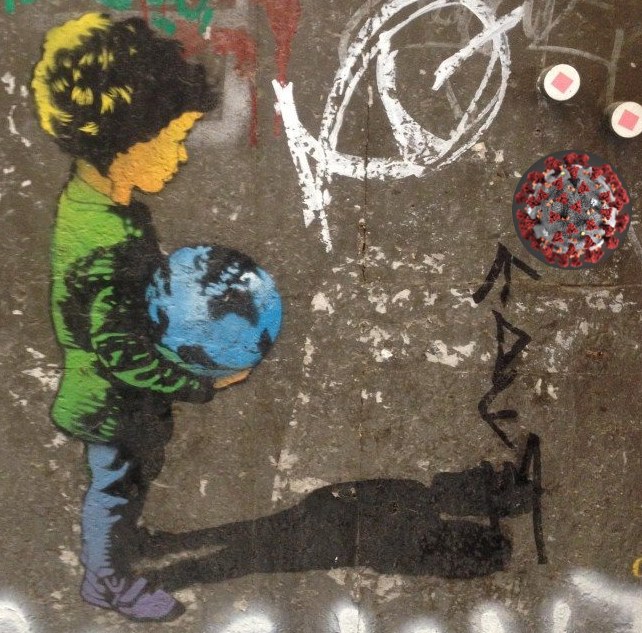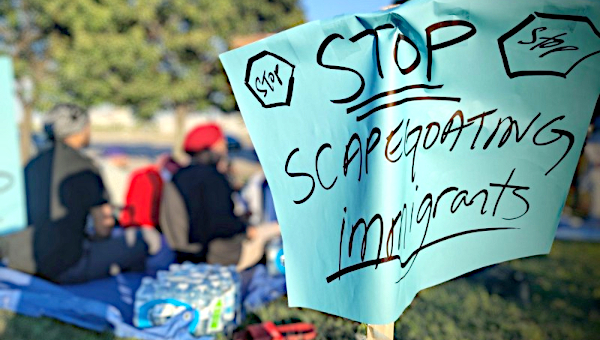The Pandemic and the Need for a New Society
During the on-going pandemic, humanity’s suffering has increased enormously. To date, June 13, 2020, 7.78 million people in the world have contracted the coronavirus, and 429,000 have died.1 In the richest and most powerful country in the world, more than 2.12 million cases have been reported, with 116,929 deaths. The adverse effects of the pandemic are massive, including loss of income and employment opportunities.2 Healthcare workers have been valiantly doing their work, often without proper protective equipment, which is in short supply even if resources are potentially available to produce them in adequate amounts. Years of funding cuts have created a healthcare system that is singularly unable to face a public health emergency. In many countries, workers are being forced by their bosses to go to work under unsafe working conditions, where they are exposed to the risk of the virus.

While the more affluent classes can choose to comfortably stay at home, millions of wage-dependent women and men are caught between a rock and a hard place: stay at home and face the risk of starvation that can cause illness or death, or go to work and face the risk of infection that can cause illness/death as well. The pandemic is, in fact, forcing us to think about what kind of society we wish to live in, what kind of society is worth fighting for. This article discusses the conception of a new society in relation to production, work and needs, ecology and spatial development, and the political in the public sphere.
Production, Work, and Human Needs
Means of production – land and other natural resources, mechanical technology (e.g., tools and machines), biological technology (e.g., seeds and chemicals) and electronic technology (e.g., software and the internet) as well as the means of transportation and communication, factories, labs, warehouses, retail and wholesale stores, etc. – will be collectively owned and controlled, initially by the workers’ state, and gradually, by ordinary men and women who do the work of production and exchange.
Means of production will be used to produce things that meet human needs – the need for food, drink, shelter, clothes, energy, transportation, healthcare, education, culture and leisure, etc. – and to produce the things (e.g., machines) that are needed to produce the means of subsistence such as food, etc.3 The motive of production will be to directly meet everyone’s needs and not to accumulate things or profit. The purpose of production will not be to increase military and political power.
Resources for production will be allocated on the basis of meeting people’s needs. If more food and shelter are needed than vacation houses, more of society’s total labour capacity and its physical resources will go to the former. There will be economic planning at multiple levels of society with active participation of people who will spend a fraction of what is now their working day.
The process of production or labour process needs people and a means of production. It does not require owners of means of production. Owning does not count as productive work. Owning does not produce anything. There will be no need for wealthy profit-driven owners or their highly-paid servile managers who lord over the workers. One does not need Mukesh Ambani (India’s richest businessperson) or Jeff Bezos (the owner of Amazon) to run the enterprises owned by them. There are enough good engineers and managers who can manage the enterprises for a decent salary subject to the democratic control over the managers by common workers. Gradually, ordinary workers will perform the work of directing and superintending that is necessary in any large-scale labour process involving numerous workers working side by side.4 Common people, the workers (whether they work with their hands or their minds or both) will be their own ‘boss’, where they make the decisions about everything in their workplace in a democratic way, together.5
No one will enjoy an income because they are property owners, whether through the collection of rent or profit or interest. In a good society, a few rich people, a few corrupt politicians, and a few corrupt officers, will not loot the common people, in the name of serving people and the nation or in the name of development. Only the ordinary people will enjoy the fruits of their work (mental, manual, or both). Those who are now capitalists will be converted into common workers.
Along with nature, which directly supplies the resources for the means of production (e.g., raw materials, etc.), human beings – as performers of work – are the co-producers of wealth. Society will restore dignity to both nature and to labour. Society will recognize people’s innate abilities and natural talents. It will make sure that people freely develop their multiple abilities and interests and are free to choose any vocation/s. No one will be forced to do a particular type of work, whether based on birth or any other criterion.
No able-bodied adult should be unemployed or under-employed.6 There will be little competition, either for work or for a market or anything else. There will be plenty of work to be done and there will be high ‘demand’ (now expressed as a need to be fulfilled) for what is produced.
In a good society, everyone should be able to perform enjoyable work for a few hours every week.7 Everyone should have enough time for their family, friends, and for leisure, personal pursuits, volunteer work, enjoying nature, expressing love and affection, and so on. How much work one does in the workplace will not be governed by the principle that the more work people do, the greater the profit. A part of people’s work will be contributing to the management of common societal affairs. More and more functions of the state will be transferred to common people as they learn new ways of living.
Doing productive work will fulfill a need, and rather than a means to earning a livelihood. And when people do their work because they love doing it, they will produce more and better things/services. Society’s productivity will be enhanced. Society’s productive powers will also develop because no longer does an economic crisis put a stop to production, and production is no longer driven by profit and exploitation. When productive powers are immensely enhanced, existing unmet needs will be met and new needs will emerge and will be met. People’s leisure time will be also increased.
It is through people’s work that they will contribute to society. Society, in turn, will meet the needs of the people, the needs that can be democratically justified (not a vacation on the moon or a million-dollar car). The needs will be met in different ways. Initially, people will receive compensation based on their work, and they then will procure their means of subsistence from society.8 So, initially, some people may receive more than others because they perform a greater amount of work and/or more skilled work: an engineer or a teacher might get more than a sweeper. Over time, however, when society reaches a stage of plenty, and when work becomes a human need, people will contribute to society depending on their variable abilities, but the needs of all will be met, irrespective of how variable the needs are and how much work one does.
Unlike in the current society where for the vast majority costs of maintenance are not covered (wages are extremely low) which accounts for the millions of working poor, in the new society, living wages will be enjoyed by all. The principle of equal ‘exchange’ will be practiced: the full cost of the reproduction of labour power will be paid.
If initially, not everyone can be provided for or is willing to engage in wage-employment, all the self-employed people will be provided full assistance from the government, and their living standards will be improved. They will be encouraged (but not forced) to form cooperatives. As workers’ wages rise immensely, many of the self-employed will voluntarily switch to wage-work.
People will perform surplus labour – i.e., they will perform longer hours than necessary just for their own reproduction. But as associated producers, they will now control how much surplus is produced and how that surplus is used. The compensation that individuals receive in return for their work will not be equal to how much they produce. Deductions will have to be made from the social product that people produce.9 Society will save resources for supporting people when they cannot or are not expected to work (e.g., women during pregnancy; children; older people; people who are ill; people who have met with an accident). A part of the total social product produced by people will need to be set aside toward the cost of the means of production (e.g. raw materials and machines and energy need to be replenished) and for the purpose of expanding the productive base (for example, to establish new factories or labs or build a new bridge across a river). A part of the social product needs to be put aside for collective provisioning by the government (e.g., education, healthcare, etc.), for dealing with emergencies and natural calamities (e.g., storms, floods, earthquakes, pandemic) and for restoring ecological health.
Harmonious Spatial Development and Restoration of Ecological Health
In a good society, the gap between manual and mental labour will be gradually closed. Connected to this division is the one between villages and cities, which will be bridged.10 Rural areas will have as many amenities as urban areas, and rural living standards will match those of urban areas. New hybrid spaces will be created which will have the advantages of rural life and urban life. It will not be a curse to live in villages. Rural life will not have the stigma it has now because of relative economic and cultural under-development. A proper health center, a library, and a non-farm workplace will be built within a reasonable distance from where people live. Given that productive investment will be rationally planned, different regions of a country will develop in a more or less harmonious manner: the living standards of some people will not be lower than those of others just because of where they live. With the force of private profit gone, productive resources will not be geographically concentrated to increase profit to avoid creating geographically uneven development and forcing different regions to compete for capital investment.
As relations of cooperation among countries develop, all countries will develop in harmony with one another, sharing their resources. No country will subjugate another country in its own interest, either through economic relations or militarism. Imperialism will be a distant memory. The majority of the world’s countries which form the Global South now will achieve a higher level of economic and cultural development.
The new society, which is no longer driven by the profit motive, will live in as much harmony with nature as possible. The gap between what is extracted from nature and what is put back into it will be reduced, just as the gap between how much people contribute and how much they receive (in private wages and government benefits) is minimized. The new society, freed from the shackles of private profit, will take immediate steps to reverse global warming and other global environmental problems. It will make massive investment in public health and it will be always prepared to deal with natural emergencies such as pandemics.
This new society will not necessarily reduce total production, because increased production of useful things is necessary to meet the unmet needs of millions and to meet new needs that will arise. However, it will produce things differently (i.e., sustainably). And it will not produce polluted air or toxic chemicals as a commodity nor will it produce military weapons. More and more production, especially, in the of food and drinks, will be organic. Nature – its rivers, hills, plants and animals, seas and beaches, the skies and valleys – will be valued as a something to enjoy as a thing in itself and as a resource to fulfill humanity needs. Nature, with labour, is the co-producer of wealth. The new valuation of nature, which includes ‘compensation to nature’, will influence the compensation to people as producers and workers (as explained earlier).
Social Consciousness, Science and Religion
As the system of production changes, and as material needs are met, a gradual change in people’s consciousness will emerge as material obstacles to the expression of humanity’s goodness are removed.
In all societies, every human being wants to avoid suffering and wants happiness. In a good society, fewer reasons will exist for one to intentionally cause suffering, emotional or physical, to another person. People will contribute to other people’s happiness and reduce their suffering. The relationship among people will be based on compassion and solidarity and not on competition and animosity.
People will not hanker after money, wealth, or possessions as private property. One person will not look at another as a way of making money or accumulating power (e.g., as a source of a vote or political influence) or as a source of status. One person will perceive meeting the needs of another person as one’s own need. Inter-personal relations, including in the most intimate sphere, will be based on a commitment to the democratic rights of all. People will relate to each other in a civil and polite manner.
In the fight against adverse natural conditions or natural calamities, or against people who are exploitative and oppressive, the toiling masses of all countries will be joined by a thread of internationalism. People living in one territory or ‘country’ will develop a sense of solidarity with people living in another place, and will have mutual respect for one another.
People of a country or a region will read about their history as a part of the history of global humanity, and will enjoy and feel proud of the accomplishments of their country or region and be critical of follies committed. And they will do the same with respect to other countries and regions and with respect to the entire humanity. A country’s or territory’s political conduct will not be driven by animosity toward another country or territory.
A good society must promote scientific temper,11 without believing that only science and technology can solve people’s problems. People will be discouraged from holding views about society which are not based in reason and evidence, whether historical or contemporary. They will be encouraged to view things from the scientific standpoint of materialism and dialectics.
Society will increase investment of resources in basic and applied natural sciences and technology. It will build on the scientific accomplishments of humanity and further these accomplishments by separating science and technology from their shell of profit-motive and militarism. Government and society will also make an effort to instill ethical values among scientists who must be sensitive to society’s material and cultural needs.
Neither religion nor the government will decide the content of education. While the state will not influence the content of education, the funding for education will come only from the state (not from private individuals or religious or any other organization).12
Every child will receive free school education. For children over a certain age, education will include direct experience in the workplace, subject to the protection of children’s health and welfare. As well, every adult will be encouraged to pursue higher education. Education will emphasize natural sciences and technology as well as the study of society and its relation to nature, in a way that is scientific and is critical of power relations and inequalities, taking history and the globally interconnected character of humanity seriously.
Along with national parochialism (and sentiments against immigrants), religious identity is important raw material for fascistic tendencies that the new society will guard itself against. As long as there is a need for religion, people should enjoy religious freedom, but within limits: religion, whether it is defined as a way of life or not, will not influence politics or education, or indeed, the public conduct of individuals. Religion must be strictly a private affair. The government should be completely separated from religion and will not practice the ‘socialism of religion’: it will not practice the principle of promoting all religions equally. It will not promote, or be influenced by any religion. No person or group will be judged based on their religion, either within the government or outside. No one will view society’s problems as being caused by differences in people’s religious beliefs and practices.
Society will fight religious obscurantism through scientific education and not through persecution. Whenever there is a conflict between religion and science or between religious values and modern laws that govern the state, the latter will be prioritized.
It is the case that sometimes quasi-scientific ideas are clothed in religious ideas within ancient scriptures. Some of these ideas may have a degree of usefulness. But these ideas, before they can be shared widely and acted on, must go through scientific verification. The mention of an idea in some religious scripture is not the proof of their validity. Even then, the government has no business setting the agenda for scientific research. The scholarly community will have its independence.
Apart from external nature (the natural environment), human beings, who are a part of that nature, have an ‘internal nature’. Human beings tend to possess – suffer from – innate feelings of excessive anxiety, anger, sadness, jealousy, hatred, self-pride, lust, etc., all of which co-exist with numerous good feelings such as love, compassion and solidarity. More or less, human emotions, positive and negative, ingrained in the human brain, are products of the material conditions, including in the class society since slavery, that the humanity has lived under. The new society will not be a perfect society: people will have negative emotions. But the new social order will make available resources for human beings to reduce the impact of these afflictive emotions on the basis of scientific ideas such as brain plasticity, as advanced in, for example, affective neuro-science pioneered by Richard Davidson and others.13 It is interesting that this neuro-scientific research, which has been able to observe the link between afflictive emotions and specific neural responses in the brain, intersects with certain ideas that originally came from world’s major religions such as Buddhism.14
Material conditions where people compete with one another and where their needs remain unmet and where their lives are controlled by physical nature or those who control the social surplus are the most important reason for afflictive emotions. Yet, material deprivation is not the only reason, even if it is the dominant one. We find afflictive emotions in affluent families and individuals. Human beings will have to make an extra effort to weaken the impact of afflictive emotions on their well-being. This effort will be easier in the new society because the force of the adverse material conditions will not exist there.

Politics in the Public and Private Spheres
In a good society, everyone’s democratic right – the right to free speech and assembly, etc. – will be respected, except for a limited period when the democratic right of only those who used to exploit and dominate common people (e.g., owners of big business, big landowners, powerful government officers, etc.) and who might want to return to their previous positions and who might create disorder in the new society, will need to be restricted but in a way that is proportionate to their degree of resistance. No one will have the right or the freedom to appropriate the fruits of another person’s labour.
No one will be discriminated against, whether in the spheres of employment or healthcare or any other sphere, because of their gender, religion, sexuality, ethnicity, caste, location, language, eating habits, and so on. One person will not be allowed to lynch another because that person worships a different god or eats a certain kind of food (beef or whatever) or decides to marry someone of his or own choice. People as workers-citizens will freely debate how to run a cooperative society, one that is without wealthy business-owners and their compliant political friends, and they may even form different types of political parties which reject the right to own private property and to exploit.
The power of politicians and high-level officers will be drastically curtailed as their material compensation will be almost like that received by the vast majority of the people and they may be recalled by the people if they do not perform their service adequately and in the interest of the people. Their role will mainly comprise the work of coordination among different parts of society and the government. They will be subordinated to the people and will not be allowed to behave like kings or wealthy business owners. No member of the family- of big and medium-sized businesses, to the extent that they exist, will be allowed to stand in election or contribute to election funding.
The new society will be judged by how well it treats traditionally oppressed groups such as women, religious, ethnic and racial minorities, and children. In all societies, parents endure suffering in order to ensure the well-being of their children. Such a sense of parental love and sacrifice will permeate the whole of the new society such that the biological parents of a child will also look after the other children in a community/neighborhood. Gradually, children will be looked after by a community of parents and not primarily inside the closed doors of a family.
The nature of the family will change. Sexual relations between two individuals, whether homosexual or heterosexual, will be entirely a private matter and fully democratized. These relations will not be affected by the government or by society, as long as no one’s democratic rights are violated and as long as public health is not endangered. There will be plenty of love and romance, and gradually, jealousy and other negative emotions in love relations will lose their force. Two people will fall in love because they wish to and not because of extraneous conditions (e.g., a person needs to be financially supported by a partner; worries about childcare, inheritance). Conditions for love will be freer, subject to the fact that, once again, love relations should not have adverse impact on the physical and mental health of the partners involved. Men and women will share care work as long as, and to the extent that, they are a part of a household/family.
Conclusion
The pandemic has given humanity a great opportunity to ask fundamental questions about society. For example, why are people’s needs, including the need for good health, not being met? Why are the governments, which are supposed to meet the common needs of society, failing to do their duties, including the duty to save lives? Why is the satisfaction of human need not being prioritized over private profit? These questions, in turn, prompt us to think about what kind of society we would like to live in.
While I discuss above some of the qualities of the new society, my intention is not to suggest that people just fold their hands and wait for such a society to appear. It won’t. People must fight for those good things right now, under, and against, the present conditions. They must fight for de-commodified services such as healthcare, indexed living wages, the democratization of the state, and states’ separation from the influence of moneybags and religion. They must fight to have more and more control over what happens in their workplaces. People should make demands for the things that they need even if the business-owners and their state say that these demands cannot be met. •
Endnotes
- These statistical data are from www.worldometers.info/coronavirus.
- Davis, Mike. “The Coronavirus Crisis Is a Monster Fueled by Capitalism.” In these Times. 20 March 2020. Toussaint, E. “The Capitalist Pandemic, Coronavirus and the economic crisis.” CADTM. 19 March 2020.
- So, the means of production will not be used any more to absorb labour in its abstract form and to maximize the extraction of labour from people to produce more surplus in the form of profit, rent, and interest.
- In capitalism, the people who do the work of directing engage in despotic control over labourers, subjecting them to oppressive power relations, in order increase exploitation and overcome resistance to that exploitation. “The directing motive… is to extract the greatest possible amount of surplus-value, and consequently to exploit labour-power to the greatest possible extent. As the number of the co-operating labourers increases, so too does their resistance to the domination of capital, and with it, the necessity for capital to overcome this resistance by counterpressure” (Capital Volume One). All these aspects of the labour process will become irrelevant in the new society.
- Of course, capital will resist this attempt of people to socially regulate production: “The same bourgeois mind which praises division of labour in the workshop, life-long annexation of the labourer to a partial operation, and his complete subjection to capital…, that same bourgeois mind denounces with equal vigour every conscious attempt to socially control and regulate the process of production, as an inroad upon such sacred things as the rights of property, freedom and unrestricted play for the bent of the individual capitalist. It is very characteristic that the enthusiastic apologists of the factory system have nothing more damning to urge against a general organization of the labour of society, than that it would turn all society into one immense factory.” (Capital Volume One)
- Whether they work will not depend on whether or not they can make money for the business owners.
- The work-week will be shorter than now, in part because the total work to be done will be shared by those who are currently employed and those who are forced to be under- and un-employed.
- Possibly, the process will be mediated by limited market relations initially, to some extent.
- Marx, K. 1875. Critique of the Gotha programme.
- “The most important division of material and mental labour is the separation of town and country” (Marx and Engels, German Ideology: Progress: Moscow, pp. p 72).
- Das, R. “The Age of Unreason: The knowledge-practice relation and its political significance.”
- Education will not be a commodity for sale and purchase nor will it be a tool to spread obscurantism.
- Goleman, D. and Davidson, R. 2017. Altered traits. Science reveals how meditation changes your mind, brain and body. New York: Penguin.
- This is why it will be mistaken to automatically believe that all religious ideas serve as “the opium of the people” (Marx, K. 1843. A Contribution to the Critique of Hegel’s Philosophy of Right). It must be noted, however, that living a non-alienated new life, a life of solidarity in a society where there is little competition and where people look after themselves will be among the biggest antidotes to afflictive emotions. These antidotes, which are rooted in objective social practice and which will shape human thinking and the human brain, are different from the methods advanced in religious and modern scientific literatures.





